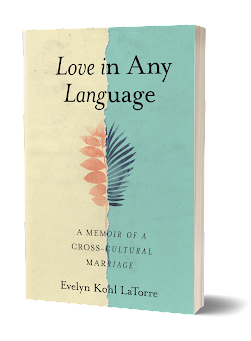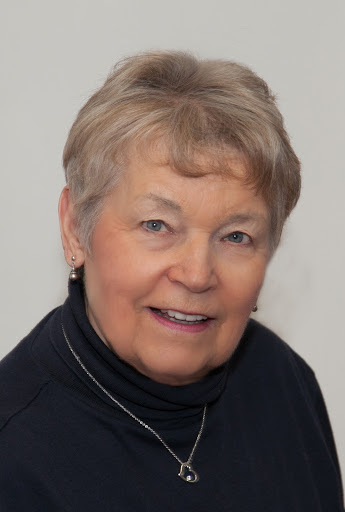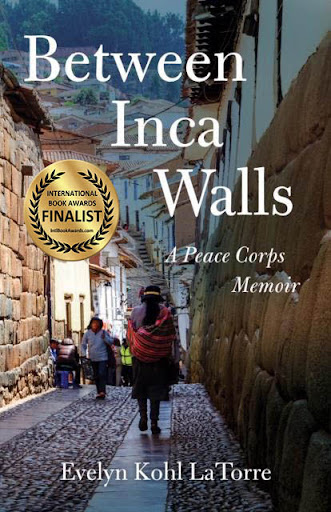“A how-to for any woman who’s determined, super-smart, assertive and willing to
wait for a husband to come into his own element. A thrilling ride all the way.”
— Tina Martin, author of “Everything I Should Have Learned I Could Have Learned in Tonga”
 SAN FRANCISCO — Clear-eyed and frank, author Evelyn Kohl LaTorre’s stunning new memoir, “Love in Any Language,” (Sept. 28, 2021, She Writes Press) beautifully illustrates the trials and joys in the blending of two cultures.
SAN FRANCISCO — Clear-eyed and frank, author Evelyn Kohl LaTorre’s stunning new memoir, “Love in Any Language,” (Sept. 28, 2021, She Writes Press) beautifully illustrates the trials and joys in the blending of two cultures.
Love is tested when Antonio, a handsome university student, and Evelyn, a strong-willed Peace Corps volunteer, fall in love. At the end of her two-year commitment in Peru, Evelyn finds herself pregnant and the 23-year-olds marry in Cusco and then move to Northern California near Evelyn’s family. Like most wives of the ’60s and ’70s, Evelyn expects her husband to support their family, and Antonio tries to take his place as head of the household. But he must first learn English, complete college, and find a job.
To make ends meet, Evelyn secures full-time work, leaving their infant son in the care of others. The couple attends college — she for two years, he for six — which tests their fortitude. When Antonio is offered a full-time professorship at the university he attended in Peru, he accepts, leaving Evelyn a single parent. Parenthood, financial stress, the pull of both countries, and long visits from Antonio’s mother threaten to destroy the bonds that brought them together.
Readers will delight in witnessing Evelyn come into her own — as a woman, as a wife and as a mother — in this moving depiction of partnership and all the intricacies that encompass marriage and love.
Early praise for “Love in Any Language”
“Dr. Evelyn LaTorre’s book is an intimate rendition of her life, starting in her insular birthplace, Montana. Later, as a young adult, working for the Peace Corps in Peru, she meets Antonio, her initially monolingual future husband. He was willing, out of love, to relocate to the U.S. and find his feet in a foreign land that was not always accommodating to him. It is an intricate book, replete with intimate detail, that aims to show us how living with The Other can enrich our lives and help us grow, even if the going is at times rough. I thoroughly recommend the book.”
Pedro Tabensky, PhD, author of “Happiness: Personhood, Community, Purpose”
“This is a most fascinating book. It offers many beautiful and moving descriptions of the author’s experiences as a Peace Corps volunteer in Peru in the mid-1960s. First, she fell in love with the country and then with a handsome Latin lover, a Peruvian whom she married. Her excellent descriptive powers provide readers with the next best thing to being there. Her candor now, looking back on her youth, is refreshing with its innocence, courageous faith, and passionate energy as she follows her heart and builds a life for herself and Antonio back in the U.S. Her opening sentence says it all: ‘I loved Peru.’ Readers will love her candid story.”
Kenneth Kelzer, LCSW, author of “The Sun and the Shadow: My Experiment with Lucid Dreaming”
“You’ll be as awed as I was at how an indomitable woman turns a shotgun wedding to a Quechua-Peruvian man into a bulletproof marriage as she gives up her preconceived ideas of what her husband’s role should be and starts playing it herself. Evelyn provides for her spouse and their children while taking classes, working, commuting and getting advanced degrees. A how-to for any woman who’s determined, super-smart, assertive and willing to wait for a husband to come into his own element. A thrilling ride all the way.”
Tina Martin, author of “Everything I Should Have Learned I Could Have Learned in Tonga”
“A fascinating read. This is a story of crafting a marriage between a Montana-raised, California-acculturated woman and a South American-Peruvian husband. The memoir includes all the challenges involved in merging two marvelous cultures and two individual lives. … The author describes a real story of career development and evolution from social worker and school psychologist to administrator of a special education school in Northern California. The reader experiences her amazing journey to become a successful career woman who has maximized her potential.”
Dr. Jackie M. Allen, MFT, associate professor of education at the University of LaVerne and co-author of “A Pathway to PDS Partnership: Using the PDSEA Protocol”
“Love in Any Language: A Memoir of a Cross-Cultural Marriage”
Evelyn Kohl LaTorre | Sept. 28, 2021 | She Writes Press
Memoir | Paperback | 978-1647421953 | $16.95
 EVELYN KOHL LaTORRE grew up in rural Southeastern Montana, surrounded by sheep and cattle ranches, before coming to California with her family at age 16. She holds a doctorate in multicultural education from the University of San Francisco, and a master’s degree in social welfare from UC Berkeley. She worked as a bilingual school psychologist and school administrator in public education for 32 years. Evelyn loves to explore other lands and cultures. To date, she and her husband have lived in and traveled to close to 100 countries. You can view her stories and photos on her website, www.evelynlatorre.com.
EVELYN KOHL LaTORRE grew up in rural Southeastern Montana, surrounded by sheep and cattle ranches, before coming to California with her family at age 16. She holds a doctorate in multicultural education from the University of San Francisco, and a master’s degree in social welfare from UC Berkeley. She worked as a bilingual school psychologist and school administrator in public education for 32 years. Evelyn loves to explore other lands and cultures. To date, she and her husband have lived in and traveled to close to 100 countries. You can view her stories and photos on her website, www.evelynlatorre.com.
Evelyn’s first published book, “Between Inca Walls” about falling in love while serving in the Peace Corps, has won much praise and numerous prizes. Evelyn is often a featured podcast guest, lecturer and guest blogger. Her work has appeared in World View Magazine, The Delta Kappa Gamma Bulletin, the California Writers Club Literary Review, the Tri-City Voice, Dispatches, Conscious Connection and Clever Magazine.
Follow Evelyn on social media: Facebook | Instagram
Previous Work: “Between Inca Walls”
 At 21, Evelyn is naïve about life and love. Raised in a small Montana town, she moves at age 16 with her devout Catholic family to California. There, she is drawn to the Latino culture when she works among the migrant workers. During the summer of her junior year in college, Evelyn travels to a small Mexican town to help set up a school and a library ― an experience that whets her appetite for a life full of both purpose and adventure.
At 21, Evelyn is naïve about life and love. Raised in a small Montana town, she moves at age 16 with her devout Catholic family to California. There, she is drawn to the Latino culture when she works among the migrant workers. During the summer of her junior year in college, Evelyn travels to a small Mexican town to help set up a school and a library ― an experience that whets her appetite for a life full of both purpose and adventure.
After graduation, Evelyn joins the Peace Corps and is sent to perform community development work in a small mountain town in the Andes of Perú. There, she and her roommate, Marie, search for meaningful projects and adjust to living with few amenities. Over the course of eighteen months, the two young women work in a hospital, start 4-H clubs, attend campesino meetings, and teach PE in a school with dirt floors. Evelyn is chosen queen of the local boys’ high school and―despite her resolve to resist such temptations ― falls in love with a university student. As she comes of age, Evelyn learns about life and love the hard way when she must choose between following the religious rules of her youth and giving in to her sexual desires.
2021 CIBA Hearten International Book First Place Winner
2020 Readers’ Favorite Book Awards Finalist in Non-Fiction – Cultural
2020 International Book Awards Finalist Multicultural Non-Fiction
In an interview, Evelyn can discuss:
- How volunteering in Peru with the Peace Corps. led to her meeting her husband
- Cross-cultural and interracial relationships and the rewards and challenges they can bring
- Gender norms for women in the ’60s and ’70s and how they have — and haven’t — evolved in the past 60 years
- Her background as an educator and specialties in psychology and multicultural studies
- How her time in South America has shaped her life
- The value of travel, social activism and education
- Why and how to write and publish a memoir
“LaTorre presents a forthright and candid voice. … LaTorre’s story is one of a determined young woman keen to achieve her goals; her relationship with Antonio will have readers guessing how the romance will turn out. Illustrated with the author’s photographs, this bold memoir offers many rich details about Peru and the Peace Corps…” ― Kirkus Reviews
“Evelyn LaTorre creates a masterful portrait of place — from the Montana hills to the peaks of Peru — and illustrates how place shapes us. The many lovely metaphors and descriptions throughout the book invite the reader to see through the eyes of an innocent girl as she discovers exotic, lively cultures; absorbs the colors, sounds, passion, and intensity of that new world; and allows it to change her life path.”
— Linda Joy Myers, president of the National Association of Memoir Writers
An Interview with Evelyn Kohl LaTorre
You detail it in your first book, “Behind Inca Walls,” but can you give a quick summary of how you and your husband met?
My future father-in-law, Adolfo Eguiluz, had requested Peace Corps volunteers to work in Abancay, Peru, for several years. My roommate, Marie, and I went there to work on community development projects. Four months into our stay, we met Eguiluz’s stepson, Antonio, and I felt an immediate attraction. He returned to Abancay often.
What were some unexpected challenges or surprises that you noticed at the beginning of your relationship?
One was how deeply Antonio cared about my well-being. As well as how volatile our feelings for one another could be, changing from cool to warm to hot and back to cool again. He also wanted me to pursue graduate studies — though he was dissatisfied with his own course of study.
Did your studies in psychology and multiculturalism help you through some of the learning curves of a relationship with someone of a different nationality and ethnicity?
Very much. I learned that personal relationships are more important in life than material possessions and bodily comforts. In college, my favorite classes were psychology, anthropology and sociology — how countries and people are similar and different in their values, food, music, manners and priorities.
I had been enamored with the Hispanic culture since college when I volunteered among California’s migrant workers in the Central Valley. Also, the theory of personality types has offered me an explanation for human differences.
What advice can you give about raising bicultural children?
Listen and learn about your partner’s culture. Then, agree on your priorities and the values you want to impart to your children. There are many ways to live life other than the way you were raised. Learn what science has discovered about children’s emotional needs. You may find a healthier way to raise offspring than how the previous generation did it.
Our children are open to differences between races, income levels and customs because they’ve experienced different cultures with diverse expectations. They tend to be flexible and accepting of others unlike them.
Was it difficult for you while writing the book to disclose personal information and stories? How do you decide what information to include and what topics are off-limits?
It was more difficult with the first book because I wrote about an important religious rule that I broke. Initially, I felt afraid of being judged in the same way my mother had judged my violation. I knew a memoir writer can be harshly criticized by others who have narrow viewpoints of what is right and wrong. People like to judge others’ decisions when they don’t mirror their own.
I remember the day I presented the chapter about the circumstances of my first pregnancy to my writer’s critique group in front of male members. I was super self-conscious and embarrassed. But I soon discovered that writing about uncomfortable incidents takes away their shame. Being honest about one’s life is a relief.
What were some of the expectations society placed on you as a wife and a mother? What changes have you personally seen regarding gender roles for women in the past 60 years?
In the 1970s a husband was expected to be the breadwinner and head of the household as opposed to sharing decisions and duties equitably. Improvement has certainly been slow.
In terms of changes in the workforce, when I was pregnant, pregnancy was seen as a disability that required leaving a job two months before the baby’s birth. Contraceptives had been available for only a few years. And employers today can’t legally discriminate against a pregnant woman and force her to quit. Also during most of my career, women felt they could do little about sexual harassment. The #MeToo movement changed that.
What do you hope readers gain from reading the story of you and your husband’s relationship?
The first is that the challenges of a mixed cultural marriage are worth the extra effort it takes. There is the potential to learn new, often better, ways to accomplish life’s tasks in an intimate relationship with someone from another country.
Marriage is like a dance but with both partners taking turns leading. It’s OK for one partner to step up and the other partner to step back as their situation requires it. It’s also sometimes worth “hanging in there” and persisting to make a marriage work.
And finally, there is value for both people in a partnership to use their strengths equally. A man comfortable in his own masculinity won’t fear a strong woman. The most important ingredient in a satisfying relationship is mutual respect and appreciation.

A former award-winning journalist with national exposure, Marissa now oversees the day-to-day operation of the Books Forward author branding and book marketing firm, along with our indie publishing support sister company Books Fluent.
Born and bred in Louisiana, currently living in New Orleans, she has lived and developed a strong base for our company and authors in Chicago and Nashville. Her journalism work has appeared in USA Today, National Geographic and other major publications. She is now interviewed by media on best practices for book marketing.

